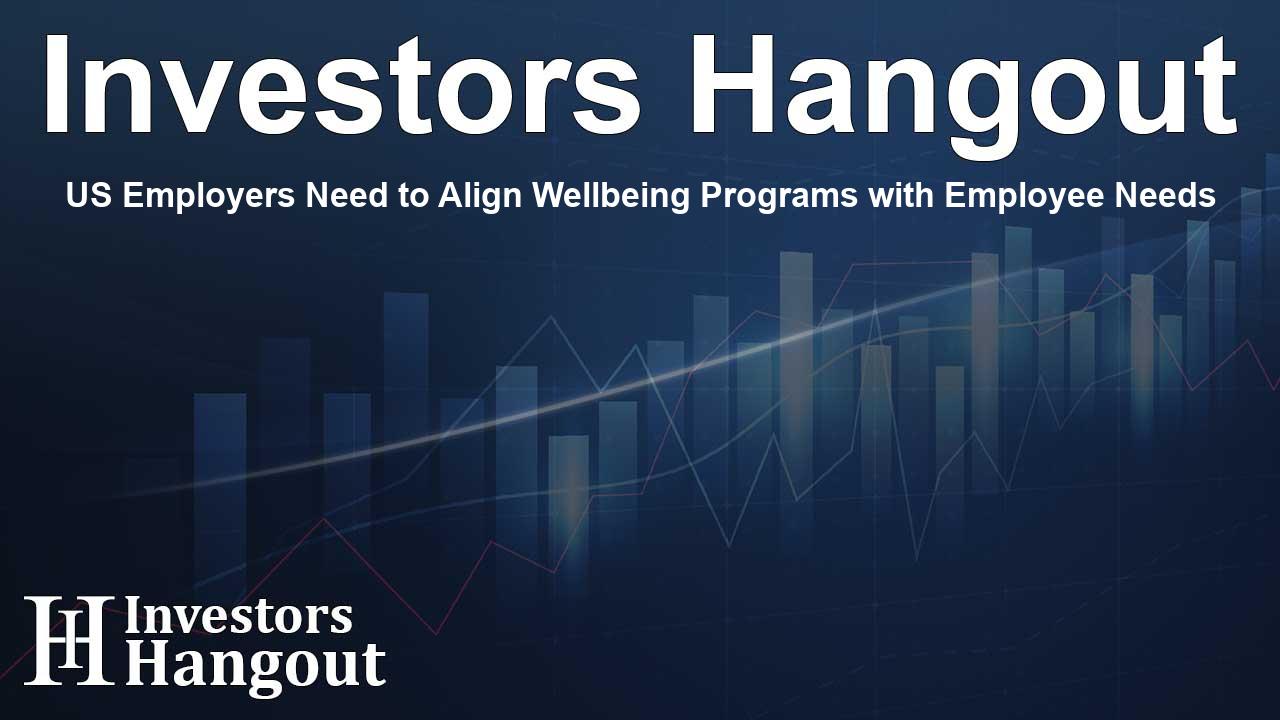US Employers Need to Align Wellbeing Programs with Employee Needs

Understanding the Gap in Employee Wellbeing Support
In today's fast-paced work environment, employers are increasingly focusing on the physical and mental wellbeing of their employees. However, recent research reveals a notable disconnect between what employers prioritize and what employees genuinely need. Despite the growing awareness of mental health crises, the focus on financial wellbeing remains alarmingly low, raising concerns about the efficacy of current wellbeing programs.
Survey Insights: Employee Concerns vs. Employer Focus
The findings from a recent Wellbeing Diagnostic Survey conducted by WTW (NASDAQ: WTW) highlight that while 73% of employers are committed to supporting mental wellbeing and 50% to physical health, employees rank financial health as their top concern at 66%. This stark contrast—financial wellbeing receiving merely 23% of attention from employers—suggests significant room for strategic enhancement in wellbeing initiatives.
The Impact of Wellbeing on Employee Productivity
When employees face wellbeing challenges, the ripple effects can severely impact workplace productivity. The 2024 Global Benefits Attitudes Survey unveiled that nearly half of U.S. employees are grappling with significant issues across multiple wellbeing domains. This situation results in reduced productivity levels, heightened burnout, and increased absenteeism. Remarkably, over half of these employees report experiencing above-average stress, with a significant percentage suggesting anxiety or depression symptoms.
Employers' Evolving Approach
Regina Ihrke, a leading expert at WTW, emphasizes that despite the call for greater attention to mental health, there remains a misalignment between employer investments and employee needs. Many organizations recognize that prioritizing employee wellbeing can lead to improved business outcomes, including better financial performance and lower turnover rates. Yet, the survey findings indicate that financial wellbeing initiatives are lagging behind, pointing to an urgent need for adjustment in strategy.
Strategies for Enhancing Employee Wellbeing Programs
As companies recognize the necessity of evolving their wellbeing strategies, many are committed to embedding these programs deeply into their corporate cultures. Recent action plans show that over 46% of companies are planning to better communicate wellbeing initiatives and establish stronger links to their company values. With over half of employers reporting a commitment to improving wellbeing practices, the potential for progress is significant.
Importance of Effective Communication
In focusing on enhancing employee wellbeing, successful communication is paramount. Jill Havely from WTW notes that delivering the right message and fostering an accessible environment for employees is essential to the success of any wellbeing initiative. Companies that take the time to understand the varied needs of their employees and create a supportive culture will likely experience enhanced employee engagement and satisfaction.
Future Outlook for Employee Wellbeing Initiatives
Looking ahead, employers are optimistic about their wellbeing initiatives. A growing number of them are planning to implement changes that position wellbeing as a fundamental aspect of their human capital strategies. Remarkably, a significant increase in attention to employee experiences can pave the way for a healthier workplace dynamic.
Conclusion: Aligning Employer Initiatives with Employee Needs
The disparity between employer priorities and employee needs presents a unique challenge and an opportunity for organizations. By realigning their focus on holistic wellbeing—embracing physical, mental, and financial health—businesses can enhance productivity and create a more resilient workforce. As emerging strategies unfold, the emphasis on communication and understanding will play a crucial role in ensuring that wellbeing programs meet the actual desires and necessities of the employees.
Frequently Asked Questions
What are the key findings of the WTW survey regarding employee wellbeing?
The survey found a gap between employer priorities and employee needs, particularly highlighting that financial wellbeing supports are crucial for employees but often neglected by employers.
How can employers better support financial wellbeing for their employees?
Employers can implement financial literacy programs, offer financial counseling services, and develop resources that specifically address financial challenges facing employees.
What role does communication play in effective wellbeing programs?
Effective communication ensures that employees are aware of available resources and feel supported, fostering a culture that prioritizes wellbeing on all fronts.
Why is employee wellbeing critical for overall business performance?
Addressing employee wellbeing is linked to improved productivity, reduced absenteeism, and better engagement, which collectively enhance organizational performance and profitability.
What are the future plans for companies regarding wellbeing initiatives?
Many companies are planning to integrate wellbeing more deeply into their strategies, improve communications, and make it a foundational aspect of their corporate culture in the coming years.
About Investors Hangout
Investors Hangout is a leading online stock forum for financial discussion and learning, offering a wide range of free tools and resources. It draws in traders of all levels, who exchange market knowledge, investigate trading tactics, and keep an eye on industry developments in real time. Featuring financial articles, stock message boards, quotes, charts, company profiles, and live news updates. Through cooperative learning and a wealth of informational resources, it helps users from novices creating their first portfolios to experts honing their techniques. Join Investors Hangout today: https://investorshangout.com/
Disclaimer: The content of this article is solely for general informational purposes only; it does not represent legal, financial, or investment advice. Investors Hangout does not offer financial advice; the author is not a licensed financial advisor. Consult a qualified advisor before making any financial or investment decisions based on this article. The author's interpretation of publicly available data shapes the opinions presented here; as a result, they should not be taken as advice to purchase, sell, or hold any securities mentioned or any other investments. The author does not guarantee the accuracy, completeness, or timeliness of any material, providing it "as is." Information and market conditions may change; past performance is not indicative of future outcomes. If any of the material offered here is inaccurate, please contact us for corrections.









